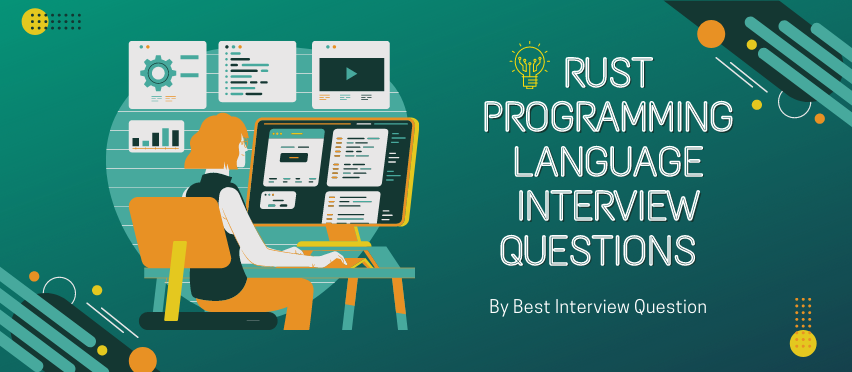Rust Programming Language Interview Questions and Answers

Rust is a system programming language that works beamingly fast, prevents system or the platform from being crashed and eliminate the chances of data races. Rust is a platform that endorses you with both control and safety. In general, Rust Programming Language endorses you with some of the great features like a good control over allocation, the garbage collector is not much required, minimum runtime and close to metal.
Here are some the Rust Interview Questions and Answers for Experienced as well as for those who want to be in that line:
It's beamingly fast system is actually supported by it's compilation to an executable binary, LLVM Optimization Suite, Competitive with C/C++ and LLVM backend. It has undoubtedly a safe & strong abstraction and it guarantees ownership. It also projects great memory management feature that means all the variable have a scope that is valid for. Once it goes out of scope, it gets automatically deallocated. The latest available version is Version 1.31.1
Most Frequently Asked Rust Programming Language Interview Questions
The most vital advantage of using Rust over C languages is its emphasis on producing safe code. As manage memory or pointer arithmetic is necessary in C programs, Rust doesn’t require any of it beginning to end. Rust allows programmers to write unsafe code, but defaulting to its safe code.
We have to use read_to_string() method, which defines the on the Read trait in std::io
There are several libraries available providing Rust asynchronous input/output such as tokio, mio, mioco, rotor and coio-rs.
Rust allows developers to arrange code in a way that fosters its reuse. By easy organization of modules available in Rust, which contain various structures, function and even other modules which users can use privately or make public according to their
The cargo new command is used to create a new project in Rust. Rust users can use below syntax create a sample project using Cargo.
$ cargo new project_name –bin
The following function can be used to read file input efficiency in Rust.
- read()
- read_to_end()
- bytes()
- chars()
- take()
&self : when Read-only reference is required to the function.
self : When a value is to be consumed by the function.
&mut : When a value needs to be mutated by the function with consuming it.
This function is used to handle errors that extract the volume inside an option. It’s also extremely useful for instant prototypes with any errors.
We can use gdb or lldb to debug Rust programs as like C and C++ programming.
Rust Error Handling is categorized into three parts:
- Recoverable Error with Results : If an error occurs, the program doesn’t stop completely. Instead, it can easily be interpreted or responded.
- Unrecoverable Errors with Panic : If something wrong goes with the code, Rust’s panic macro comes into action, shows the error message, clean the error and then quit.
- Panic or Not to Panic : When you are dicey about calling panic or not, write the code that panics and the process will continue as 2nd.
Development History
The history of Rust is basically categorized into 4 parts called EPOCHS:
The personal year (2006-2010) → Graydon years (2010-2012) → Typesystem years (2012-2014) → Release year → (2015-2016)
Graydon Hoare, with the contribution of with contributions from Brendan Eich, Dave Herman and others designed Rust at Mozilla Research.
Latest Version
Every 2-3 years, a new version of Rust Programming Language is produced.
- In 2015, the Rust version 1.0 was released
- In 2018, the Rust version 1.31 was released